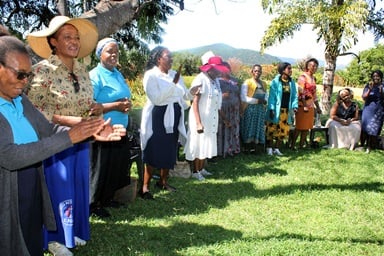The United Methodist Church in Nigeria is helping widows obtain new skills — and then watching as those efforts multiply when the women return home and train other widows.
About 78 widows in the North East Nigeria Conference have received training since the program began two years ago. It’s estimated that those women have trained about 200 widows in their 13 districts, according to the Rev. Titus Ibrahim, the training facilitator and Tewi District superintendent.
“The conference made a wise decision to focus on the training of widows … Touching the life of a widow or any underprivileged (person) is the best way to share Jesus Christ with the larger community,” Ibrahim said.
The training began as a way to help widows in the conference become more self-reliant. Oftentimes, women are abandoned by their late husband’s family. Some lose their homes and live in poverty as they struggle to take care of their children.
“The training has impacted my life by helping (me) to start a small business, and (it) is growing steadily,” said Helen Nehemiah, secretary for the Tewi District’s widows committee.
The women learn to make soap, local cream and jewelry, among other things.
Like Nehemiah, several trainees have started their own businesses, while others serve as workshop facilitators in their districts. The conference pays for 30 percent of the costs of the annual training and the local chapter of United Methodist Women pays 70 percent.
“I am using the skills acquired to train about 18 widows in my district,” said Helen Ezekiel, who lost her husband more than 10 years ago. “Seven of these trainee widows are soap makers (or) morning fresh (liquid soap) makers and have set up some businesses, too.”
The workshops also include evangelism training so that the women are equipped to share information about The United Methodist Church and spread the good news during crisis periods. The northeastern region of Nigeria continues to be plagued by conflict, including attacks by Boko Haram, a militant Islamic group, and clashes over land between herdsmen and farmers.
The Rev. Yahuda Nero Zailani, conference administrative assistant to Bishop John Wesley Yohanna, said the bishop and conference support the program for two reasons.
“The widows are left with fatherless children who are vulnerable to disease, hardships and trauma,” he said. “Widows, and even women in general, are more transparent and faithful in utilizing resources made available to them, both knowledge material and finances.”
Ezekiel said she has used what she learned during the training to improve her family’s livelihood.
“This year, I paid the school fees of my three children without assistance from anybody,” she said. “With gains realized from my business, I can now feed my family with three square meals daily.”
Danjuma is a communicator for the North East Nigeria Conference. News media contact: Vicki Brown at 615-742-5470 or [email protected]. To read more United Methodist news, subscribe to the free Daily or Weekly Digests.
Like what you're reading? Support the ministry of UM News! Your support ensures the latest denominational news, dynamic stories and informative articles will continue to connect our global community. Make a tax-deductible donation at ResourceUMC.org/GiveUMCom.




